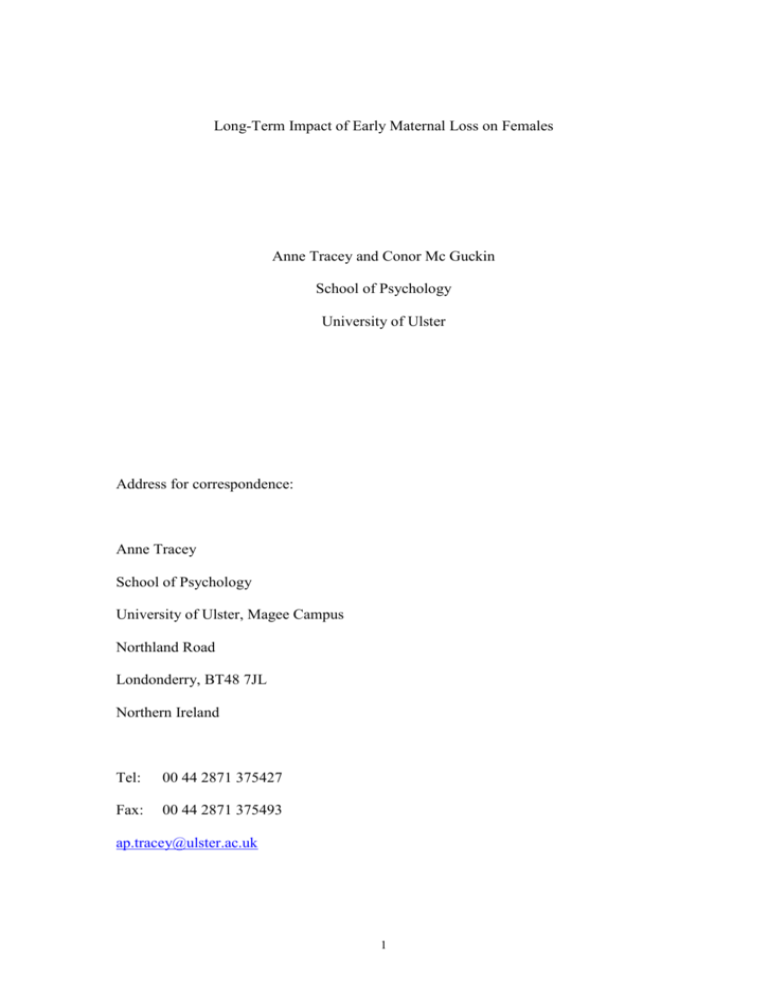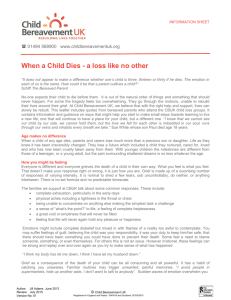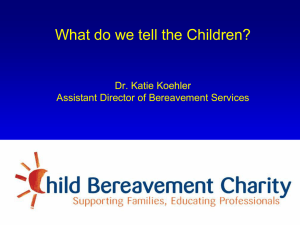12 - edepositIreland
advertisement

Long-Term Impact of Early Maternal Loss on Females Anne Tracey and Conor Mc Guckin School of Psychology University of Ulster Address for correspondence: Anne Tracey School of Psychology University of Ulster, Magee Campus Northland Road Londonderry, BT48 7JL Northern Ireland Tel: 00 44 2871 375427 Fax: 00 44 2871 375493 ap.tracey@ulster.ac.uk 1 Long-Term Impact of Early Maternal Loss on Females 2 Introduction Loss is a universal experience. While it remains a uniquely personal experience, bereavement is often central to psychological distress in the lives of many people. The present article presents a review of the theory and research around an area of bereavement and distress that has, as yet, not been adequately addressed. The area in question is early childhood loss and the long-term effects on the physical and mental health of bereaved children – especially girls. From this, the state of current research in this area within an Irish context is illuminated. Bereavement and Adult Mental Illness In Ireland, in recent years, there have been investigations into violent bereavement (Dillenburger, 1992), spousal loss (Earls, 1994) and death through suicide (O’Connor, 1997). These studies have been helpful in providing knowledge and insight into how bereaved people have experienced and dealt with their own specific type of loss. A particular area of bereavement that has received little attention in Ireland and requires much needed research is that of early childhood loss. This situation is, however, being helped by the publication of papers such as that of McGovern and Barry (2000) who examined the attitudes of parents and teachers in connection with death education and childhood grief. There have been many developments in our knowledge and understanding of loss and bereavement since the early theoretical foundations provided by Freud (1917) and Bowlby (1980). Their influential contributions paved the way for subsequent studies investigating the effects of loss through death. As such, their theories have permeated the scientific study of grief in the 20th Century and still continue to do so in these first few years of the new millennium. One of the themes 3 emerging from these early studies was that depression in adulthood is an inevitable result of loss in early life. Much of the research that followed, set out to confirm or dispute the link between early loss and psychopathology in later life. Early clinical studies produced contradictory and inconclusive findings regarding the link between early loss and the risk of adult mental illness. For example, studies yielded mixed results about the age at which loss is most critical to future mental health. Whilst some researchers argued that the age of four was the most significant in relation to risk for psychopathology (Beck, Sethi, & Tuthill, 1963), others found that the first nine years was the period most likely to be significantly related to adult mental illness (Birtchnell, 1972, 1980). Despite the fact that one of the main criticisms of such studies was the over-reliance on psychiatric samples (Dilworth & Hildreth, 1998), they did nevertheless reveal and highlight the importance of early parental death in the lives of females. More recent research (Brown & Harris, 1977) has confirmed this finding in that whilst early parental death predicts a higher likelihood of depression for females, males who lose a parent through death before the age of seventeen are more likely to be autonomous and responsible (Maier & Lachman, 2000). Depression in adult men has been found to be more likely to occur as a result of parental divorce in childhood (Maier & Lachman, 2000). In explaining their findings that confirmed a higher incidence of depression in adult females than adult males as a result of early parental loss, Brown and Harris (1977) argued that, if the mother is the daughter’s primary source for learning how to master or control the environment, then the loss of the mother before the age of 11 may permanently affect their feelings of personal control, thus leading to mental health difficulties in later life. Thus, if it is the case that females are predisposed to 4 psychopathology in adulthood as a result of losing a parent in early life and that, specifically, the loss of a mother is a more significant loss in the life of a daughter, attention needs to be given to finding out more about the specific impact of early maternal loss on female survivors. Research to date that has concentrated on female populations has uncovered some interesting findings. For example, it has been found that the high risk of depression in adult females as a result of maternal loss or separation in childhood could be explained by other ‘vulnerability’ factors such as: the lack of adequate parental care following the loss, premarital pregnancy, marital separation\divorce, helplessness or low self-esteem (Bifulco, Brown, & Harris, 1987; Harris et al., 1986, 1990). In looking at the relationship between the death of a parent and the development of serious emotional problems in the surviving children, Silverman and Worden (1993) and Worden and Silverman (1996) have reported data from the Child Bereavement Study that demonstrates that a significant percentage of bereaved children compared with non-bereaved children were identified as having such problems. Non-clinical studies with children have demonstrated that in some cases, responses to loss are determined by the child’s emotional condition before the loss and the presence or absence of family conflict (Elizur & Kaffman, 1983). In one study of acute parental bereavement in preschoolers, children, particularly girls as young as three, express their emotions of grief (Kranzler, Shaffer, Wasserman, & Davies, 1990). This helps to support the notion that the level and quality of support available to children is influential in the years following the bereavement. The influence of familial conditions is also evident from the findings of Hurd (1999). His study showed that a ‘strong supportive family environment’ could help the child to 5 resolve their grief, thus reducing the long-term risk of depression. The factors that can determine a positive outcome for the child included a good relationship with the parent prior to the death, continued emotional and psychological support from the remaining parent and honest communication with the child about the death and its impact on the family (Hurd, 1999). However, if these are the factors that are required for the resolution of early loss, then the question is - are families suitably equipped, emotionally, mentally and psychologically to provide children with the conditions within which they can grieve in healthy ways? If not, what kind of help can be provided? According to Mc Govern and Barry (2002), society is in a state of transition and schools are playing an increasingly important role in dealing with issues surrounding grief and bereavement. This is good news, but perhaps, it is not only time to review how bereavement, grief and loss (particularly in early life) is managed in Ireland, but that more education and training is provided for families, schools, employers, and helping agencies. In this way, everyone has more knowledge and understanding of loss and what it means and that the responsibility for our bereaved population is shared, not attributed to one grouping or the other. Current Research Perspectives and Future Directions As previously highlighted, one criticism levelled at some research in the area is that it has focussed upon psychiatric populations. Thus, research that has targeted those who have required medical help for mental health problems may do little more than confirm that adversity in early life leads to psychopathology in adulthood. Although there has been an increased number of publications centring on normative populations, the studies have, in the main, employed quantitative methodologies and only a few have concentrated on daughters who have survived early loss. 6 Whilst quantitative research in this area is welcome and is furnishing us with interesting insights, nothing helps our understanding of the personal impact of loss more than hearing someone tell their story. Whether it is spoken or written, the individual’s account helps us to realise that each person’s response to bereavement is a unique and personal grief experience. The qualitative study of adult daughters who have lost a mother in childhood is a fruitful way of exploring how the event has impacted on their lives. A qualitative study of early loss has not been done before in Ireland. In fact, no study of maternally bereaved daughters who have lost their mothers prior to eleven using only qualitative methods can be found. Current research in an Irish setting is addressing this imbalance (Tracey, 2001, 2002). Statistics provided by the Central Statistics Office (Dublin) and the Northern Ireland Statistics and Research Agency (Belfast) (personal communications) for the northern region or Ireland (taking in the six counties of Northern Ireland and the County of Donegal) reveal that over the last decade (1990- 2000) an average of 347 women, aged 20 - 49 died each year. In each of the same years, an average of 13,000 female children were born. These figures alone indicate that there will be female children every year who will face the loss of a mother. Adopting a qualitative approach will ensure that those who participate in the study are given a voice to share their experience of loss and that the meanings extracted from their stories will be preserved in the process. In this way, it will be possible to gain further insight and understanding of the impact of maternal loss on the lives of daughters in Ireland. It may help to reveal how daughters perceive the loss to have impacted on their lives in terms of health (mental, physical, emotional), relationships, career, their role as parent/mother. 7 The findings will help us to understand more about the plight of daughters bereaved of a mother in childhood. They may also help to guide us on what might need to be done in order to improve the quality of life for survivors. In particular, there may be pointers for the bereaved population under study, for those who provide them with therapeutic and medical help and it may alert families, communities and employers to the needs of early loss survivors. More importantly, the study could produce findings that will be helpful to those daughters who have lost a mother in childhood and to those who will be maternally bereaved in the future. Conclusion If we accept that there is a risk of mental illness in later life for those who do not have an opportunity to resolve their grief and that there is a need to address the issue of how we, in Ireland, manage bereavement, grief and loss, particularly loss in early life, then insights into the impact of early childhood loss are necessary. The fact that there is a differential outcome in terms of later mental illness for females bereaved of a mother in childhood suggests that interventions and follow-ups should differentiate and distinguish between male and female survivors. The findings from research into early childhood loss could contribute to the knowledge and understanding of this phenomenon and help to formulate part of the training and education that is required for the future. In a comprehensive review of the grief literature, Parkes (2002) outlined his vision for the future. In his vision he refers to the need for appropriate and effective help for those in grief and he hopes for a future “ … where parents as well as children, leaders as well as followers, receive the cherishing and support that they need; where the griefs that are a necessary part of life are recognised as such and those who suffer them receive understanding and wise counsel” (p. 383). 8 Anne Tracey, C. Psychol., is lecturer in psychology at the University of Ulster and is a volunteer with Cruse Bereavement Care. 9 References Beck, A.T., Sethi, B., & Tuthill, R.W. (1963). Childhood bereavement and adult depression. Archives of General Psychiatry, Vol. 9, 295–302. Bifulco, A.T., Brown, G.W., & Harris, T.O. (1987). Childhood loss of parent, lack of adequate parental care and adult depression: A replication. Journal of Affective Disorders, Vol. 12, 115-118. Birtchnell, J. (1980). Women whose mothers died in childhood: An outcome study. Psychological Medicine, Vol. 19, 699-713. Birtchnell, J. (1972). Early parental death and psychiatric diagnosis. Social Psychiatry, Vol. 7, 202-210. Bowlby, J. (1980). Attachment and Loss: Loss, Sadness and Depression (Vol. 3) Middlesex: Penguin. Brown, G.W., & Harris, T. (1978). Social Origins of Depression. London: Tailstock. Dillenburger, K. (1992). Violent Bereavement: Widows in Northern Ireland. Aldershot: Avebury. 10 Dilworth, J.L., & Hildreth, G.L. (1998). Long-term unresolved grief: Applying Bowlby’s variants to adults survivors of early parental death. Omega, Vol. 36, No. 2, 147-159. Earls, H.A. (1998). Longitudinal Adaptation to Spousal Bereavement in Irish Widows and Widowers: An Examination of Grief, Depression, Coping Processes and Risk Factors. Ph.D. Thesis. Galway: National University of Ireland. Elizur, E., & Kaffman, M. (1983). Factors influencing the severity of childhood bereavement reactions. American Journal of Orthopsychiatry, Vol. 53, No. 4. Freud, S. (1917). Mourning and Melancholia in The Standard Edition of the Complete Psychological Works of Sigmund Freud, Vo. 19. London: The Hogarth Press. Harris, T.O., Brown, G.W., & Bifulco, A.T. (1990). Depression and situational helplessness/mastery in a sample selected to study childhood parental loss. Journal of Affective Disorders, Vol. 20, 27-41. Harris, T.O., Brown, G.W., & Bifulco, A.T. (1986). Loss of parent in childhood and adult psychiatric disorder: The role of lack of adequate parental care. Psychological Medicine, Vol. 16, 641-659. Hurd, R.C. (1999). Adults view their childhood bereavement experiences. Death Studies, Vol. 23, 17-41. 11 Kranzler, E.M., Shaffer, D., Wasserman, G., & Davies, M. (1990). Early childhood bereavement. Journal of American Academy of Child Adolescent Psychiatry, Vol. 29, 4: 513-520. Maier, E.H., & Lachman, M.E. (2000). Consequences of early parental loss and separation for health and well-being in midlife. International Journal of Behavioural Development, Vol. 24, No. 2, 183-189. McGovern, M., & Barry, M.M. (2000). Death education: Knowledge, attitudes, and perspectives of Irish parents and teachers. Death Studies, Vol. 24, 325-333. O’Connor, R.C. (1997). Suicide and Parasuicide: Aspects of Identification and Prevention. Ph.D. Thesis. Belfast: Queen’s University Belfast. Parkes, C.M. (2002). Grief: Lessons from the past, visions for the future. Death Studies, Vol. 26, 367-385. Silverman, P.R., & Worden, J.W. (1993). Children’s reactions to the death of a parent. In M. Stroebe, W. Stroebe, & R.O. Hansson (Eds.), Handbook of Bereavement (pp. 300-316). Cambridge, England: Cambridge University Press. Tracey, A. (2002). Early Childhood Loss. Paper presented at The British Psychological Society, Northern Ireland Branch, Annual Conference. Virginia, Co. Cavan. 12 Tracey, A. (2001). Early Childhood Loss: The Impact of Maternal Loss in Early Life on the Lives of Surviving Daughters. Paper presented at The British Psychological Society, Northern Ireland Branch, Annual Conference. Virginia, Co. Cavan. Worden, J.W., & Silverman, P.R. (1996). Parental Death and the Adjustment of School-Age Children. Omega, Vol. 33, 91-102. 13








